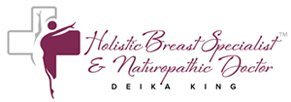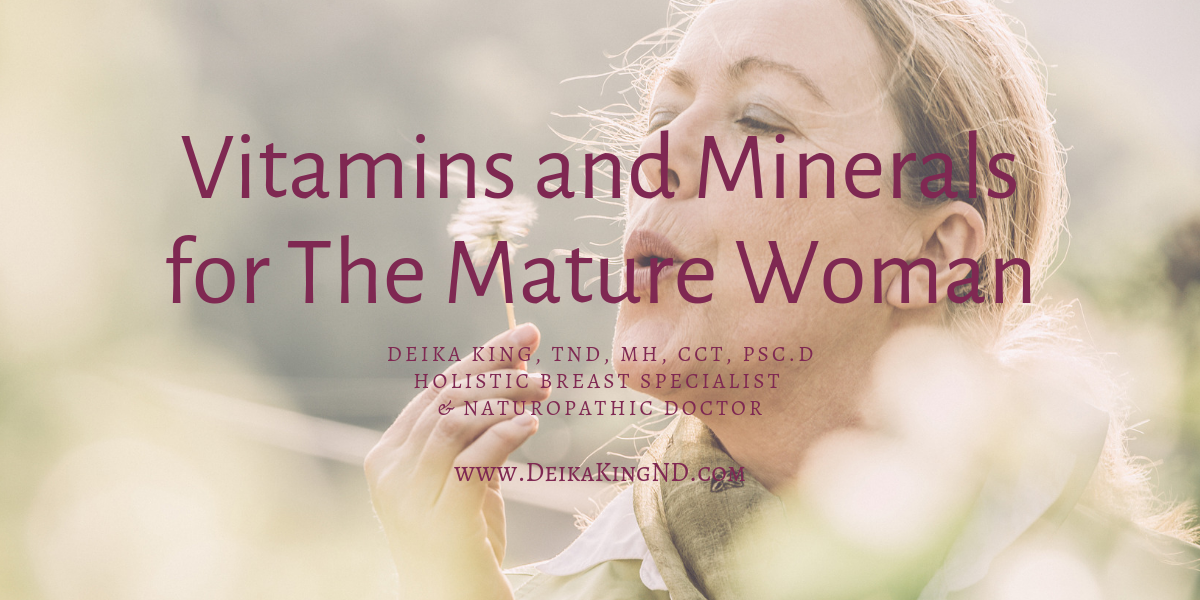Vitamins and minerals are required for good health. They help the body function in a healthy manner. They help boost the immune system to stave off unwanted disease and illness. Vitamins and Minerals keep your body strong to cope with the changes that occur to your body as you age.
As a woman reaches her forties, she may begin to enter the peri-menopausal or even menopausal stage of her life. There is no way to avoid these stages. They are simply a part of a woman’s life.
However, you can take personal steps to better manage the symptoms it brings by keeping your body and mind in their best possible health with the right vitamins and minerals.
There are many vitamins and minerals required for good health. And trace elements are only needed in minute amounts. Nonetheless, are still vitally necessary. A well-balanced diet is essential to optimum health.
The following list of vitamins and minerals are some of the vital nutrients that your body will need as you hit your 40’s.
– Magnesium
Magnesium can regulate the neuronal function of a woman’s brain and this makes it helpful in warding off depression. Studies have shown that the inclusion of magnesium can keep the symptoms of depression at bay.
Women 31 years of age and above should have a daily intake of about 320 mg of magnesium through dietary sources. This recommended amount can also help safeguard a woman’s cardiovascular health. The magnesium is beneficial in dilating the blood vessels, dissolving blood clots and preventing spasms or cramps in the heart. A ‘heart cramp’ is what we call a heart attack.
Magnesium is also one of the key players for bone health. Magnesium deficiencies in women indicate a higher risk of developing osteoporosis.
This is because a magnesium deficiency may create adverse reactions in the body’s calcium metabolism while affecting the reproduction and function of hormones that are responsible for regulating calcium.
- Magnesium Food Sources – Fish, avocado, banana, raw spinach, squash seeds, beans and lentils.
– Calcium
Women’s bone health suffers less if the body is in perfect ‘vitamin and mineral’ balance before reaching menopause. Too much calcium is not a good thing, although we have been led to believe we need massive amounts for strong, healthy bones.
We need a balance of calcium with magnesium for our bones to be healthy. In the absence of adequate magnesium, calcium cannot form bone.
Calcium is available from a variety of food sources, not only dairy products. Many health experts believe that calcium obtained from plant sources is better utilized than that from dairy.
Women below 50 should have 1,000 milligrams of calcium in a day, along with the required amount of magnesium and women over 50 require 1200 milligrams per day, plus their magnesium.
Besides being good for the bones, calcium is also needed by the body for muscle contraction, cell signaling and several nerve functions. Calcium is crucial for our heart, muscles, and for our blood to clot.
- Calcium Food Sources – Cheese, spinach, tofu, yogurt, sardines, sesame seeds and collard greens.
B Vitamins
Many women entering their peri-menopausal stage are suffering from adrenal fatigue. Therefore, getting the required amount of B vitamins daily helps support the healthy functioning of the adrenal glands.
Vitamins B-6 and B-12 are essential for the production of the hormone serotonin, which helps boost a woman’s mood, staving off the symptoms of mood swings and depression which are very common among peri-menopausal and menopausal women.
Brain fog, confusion and difficulty concentrating are just some of the many symptoms that many women experience in their 40’s and beyond. There can be contributing factors for this, but a lack of B vitamins is one, so make sure your intake is adequate.
- Vitamin B Food Sources – Spinach, broccoli, beets, lentils, asparagus, turnip greens and parsley.
– Vitamin C
One of the most important vitamins for good health! Vitamin C is crucial for heart health as it plays a role in vasodilation. Mature women who have problems with high blood pressure, diabetes, high cholesterol and congestive heart failure can benefit from taking 500 mg of vitamin C daily.
The American Heart Journal showed that the regular intake of vitamin C can help reduce heart failure mortality rate.
As an added bonus, the American Journal of Clinical Nutrition revealed that mature-aged women who consumed vitamin C daily had better skin complexion and fewer wrinkles. This is due to vitamin C acting as an antioxidant, which helps fight against the signs of aging.
- Vitamin C Food Sources – Broccoli, tomato, papaya, cauliflower, kale, sweet potato, artichoke and kiwi.
If you are interested in women specific problems can be alleviated with nutrition, please schedule an initial consultation with our office HERE.
Deika King, TND, MH, CCT, PSc.D
Traditional Doctor of Naturopathy Houston
8732-422-7271







